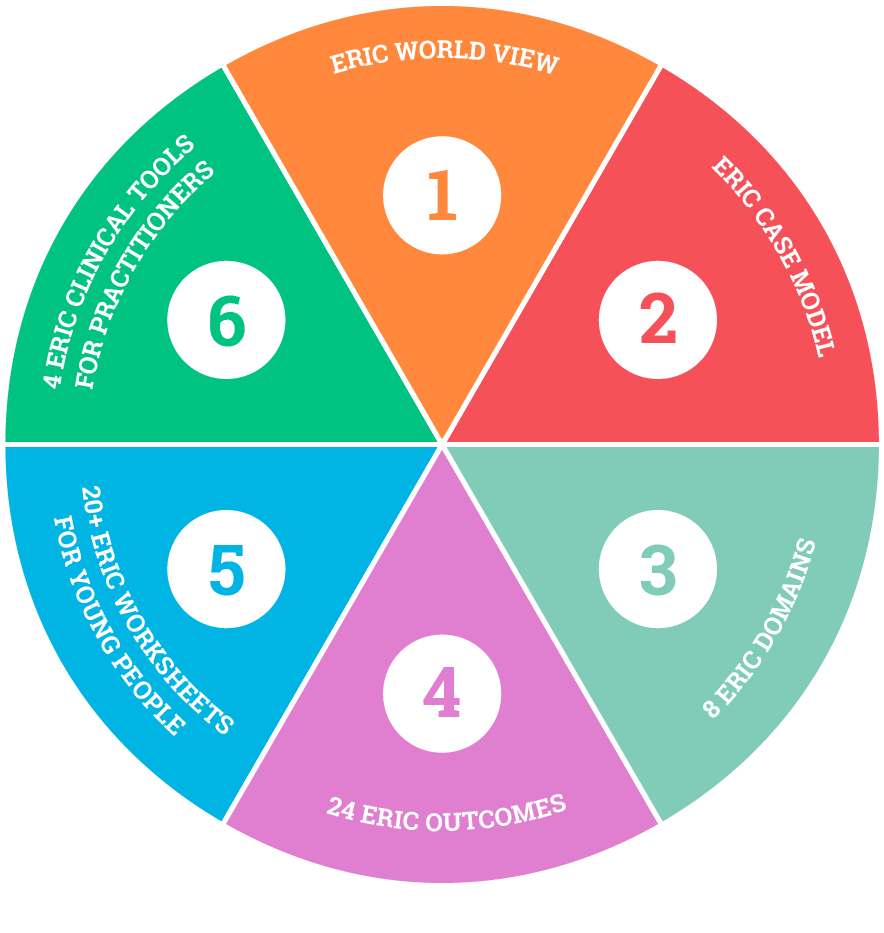FREQUENTLY ASKED QUESTIONS
Below are some of the most frequently asked questions regarding ERIC. If you’d like to know more, please don’t hesitate to get in touch.
ERIC is a modular program designed to promote the development of helpful Emotion Regulation and Impulse Control skills. ERIC contains a number of elements that support skill building across eight domains. ERIC has 24 emotion regulation outcomes for young people. There are 20+ ERIC worksheets and tools to help you cultivate these outcomes. A number of core assumptions underpin the ERIC World View, which is an essential mindset to adopt when delivering ERIC.
Emotion regulation is a multifaceted psychological construct that involves skills in the following areas: (1) accepting emotions as they occur, naming them accurately and discriminating between different emotions; (2) applying effective strategies when distressed that modify emotions in a desired way; (3) reducing unhelpful impulsive responses to strong emotions in order to remain focused on goal-directed behaviour; and, (4) being able to compassionately support or soothe oneself when distressed.
Impulse control is a multifaceted construct that has been defined as involving the following: (1) tolerating or stopping before acting impulsively when experiencing negative emotions; (2) thinking through the consequences of a behaviour before acting; (3) being persistent in spite of uncomfortable feelings, such as being able to stick at an activity that is boring or difficult; and, (4) weighing up the risks before engaging in exciting new experiences.
ERIC is appropriate for vulnerable young people with complex needs. ERIC has been evaluated with young people who are seeking help in alcohol and other drug (AOD), mental health, youth justice, out-of-home residential care, and primary care settings. ERIC is trauma-informed and sensitive. The ERIC skills are useful for all young people.
Any adult who has an established therapeutic and trusting relationship with a young person can deliver ERIC. ERIC has been evaluated with youth workers, social workers, case workers, psychologists and practitioners from justice, mental health, AOD, community health, and educational settings.
The eight ERIC modules are designed to be delivered flexibly. Each of the eight ERIC modules ‘stands alone’ and can be delivered in any sequence to suit the young person’s needs. There are several ERIC Tools that help inform which ERIC skills to focus on and where to start. ERIC skills can be taught with a worksheet and typically take 7 to 10 minutes to introduce and practice. ERIC skill building can also occur without using a worksheet. ERIC skills and processes can be woven into day-to-day interactions with young people. ERIC is an adjunctive program and can be delivered alongside existing interventions or programs.
ERIC has been successfully delivered as an adjunctive emotion regulation intervention in various settings including structured vocational programs, residential AOD treatment, youth drop in centres, youth detention and justice centres, community health, youth outreach, counselling, out-of-home residential care and primary mental health services. ERIC is underpinned by acceptance-based cognitive and behavioural theories and complements a range of therapeutic approaches. When you are familiar with ERIC, it can easily be integrated into existing service delivery.

The feasibility, acceptability, and effectiveness of ERIC has been investigated through a single-arm, multi-site pilot study (Hall et al., 2021) and a case-series investigation (Sloan et al., 2018). Both of these studies indicated ERIC to be an acceptable, feasible intervention when implemented alongside treatment as usual. Regarding clinical effectiveness, ERIC has been shown to lead to statistically and clinically significant improvements in emotion dysregulation, experiential avoidance, depression, anxiety, and stress.
Undertaking ERIC training is not necessary in order to use ERIC. ERIC is a modular program that is designed to be delivered flexibly and creatively, as long as intervention is working towards ERIC outcomes. Many practitioners are already working towards these outcomes in their everyday practice; ERIC provides a theoretical and treatment framework to ensure this practice is grounded in current, evidence-based understanding of emotion regulation and impulse control.
That said, training can be helpful in kick-starting or bolstering your ERIC practice. Many practitioners report having a better understanding of ERIC principles and how ERIC can fit in their practice following training. The ERIC team offers three different levels of ERIC training, which you can about read about here.



